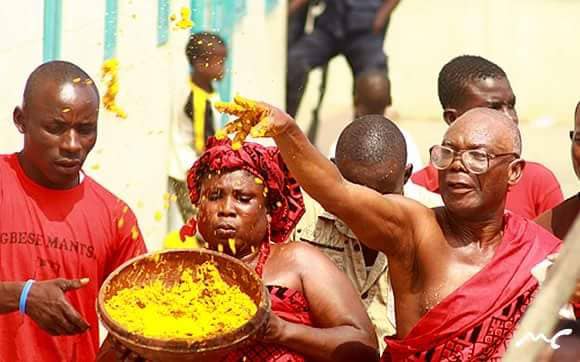
Discover the rich history, cultural significance, and modern relevance of Ghana’s Homowo Festival, a vibrant celebration of the Ga people’s harvest and heritage. Introduction
The Homowo Festival is one of Ghana’s most vibrant and culturally significant traditional festivals. Celebrated primarily by the Ga people of the Greater Accra Region, Homowo is a joyous harvest festival that symbolizes overcoming famine and hardship. Marked by rich customs, rhythmic drumming, colorful dancing, and ceremonial feasting, the festival plays a crucial role in uniting the Ga community and preserving their cultural identity.
This article explores the Homowo Festival’s origins, evolution, cultural importance, and modern-day relevance. Whether you are passionate about Ghanaian traditions, interested in African cultural festivals, or a traveler seeking authentic experiences, understanding Homowo offers a window into Ghana’s rich cultural tapestry. We will also highlight key moments of the festival and discuss its challenges and future prospects.
Early Background and Origins of the Homowo Festival
Cultural Showcases: The festival now includes durbars of chiefs, public addresses, traditional drumming, and dancing, showcasing Ga culture.
- Diaspora Celebrations: Ga communities worldwide celebrate Homowo, linking the global Ga diaspora to their roots.
- Tourism and Media: Growing media coverage and tourism interest have increased Homowo’s profile nationally and internationally.
These developments have made Homowo a symbol of cultural pride and an important event on Ghana’s cultural calendar.
Achievements and Importance of the Homowo Festival
The Homowo Festival has multiple layers of importance:
- Cultural Identity: Homowo fosters a strong sense of identity among the Ga people and preserves their language, music, dance, and customs.
- Community Unity: The festival strengthens social bonds among Ga communities, encouraging reconciliation and collective celebration.
- Agricultural Significance: Homowo underscores the importance of agriculture and gives thanks for bountiful harvests.
- Economic Impact: The festival boosts local economies through increased commerce, tourism, and artisan crafts.
- Educational Value: Homowo educates younger generations about their history and traditional values.
The term “Homowo” literally means “hooting at hunger.” The festival dates back several centuries to a period when the Ga people experienced a severe famine. According to oral history, the Ga ancestors prayed and performed rituals to overcome this period of scarcity. When the famine finally ended, the community celebrated with a festival to “hoot at hunger” and express gratitude for the harvest.
Homowo is deeply rooted in agricultural traditions, particularly the millet harvest, and it is a thanksgiving festival that honors ancestral spirits and the earth deity for providing sustenance. The festival also marks a period of renewal and spiritual cleansing for the Ga people.
Rise and Development of the Homowo Festival
Over time, Homowo has grown beyond a simple harvest celebration to become a grand cultural event celebrated annually across Ga communities and the diaspora. Some key aspects of its development include:
- Rituals and Ceremonies: Homowo involves a series of rituals, including the sprinkling of “kpokpoi” (a traditional millet meal) to honor the ancestors.
- Duration and Timing: The festival is usually celebrated between August and September, beginning with the “Nmaadumo” (the first planting) and ending with the grand Homowo feast.
Modern adaptations include the use of digital platforms to promote Homowo globally, collaborations with cultural organizations, and inclusion in national cultural policies. These efforts help maintain the festival’s relevance and ensure that Homowo continues to inspire pride among the Ga and all Ghanaians.
Conclusion
The Homowo Festival is a vibrant celebration of Ghanaian heritage, agriculture, and community spirit. It honors the resilience of the Ga people and their triumph over historical famine, while promoting unity and cultural pride. As Ghana embraces modernity, Homowo stands as a living testament to the power of tradition and cultural continuity.
FAQs About the Homowo Festival
Q1: What is the main focus of the Homowo Festival?
A1: Homowo primarily celebrates the end of famine and the harvest, symbolizing abundance and gratitude.
Q2: When is the Homowo Festival celebrated?
A2: Homowo is typically celebrated between August and September each year.
Q3: What are some key activities during Homowo?
Its success lies in blending cultural preservation with social and economic development.
Challenges and Controversies Surrounding the Homowo Festival
Despite its cultural richness, the Homowo Festival faces some challenges:
- Modernization Pressures: Changing lifestyles and urbanization threaten the transmission of traditional practices.
- Funding Constraints: Organizing large-scale celebrations can strain local resources.
- Youth Engagement: Attracting and involving younger Ga people remains a challenge.
- Environmental Concerns: Waste management during the festival needs improved attention.
- Cultural Dilution: Increased commercialization risks diluting the festival’s spiritual and cultural meanings.
Addressing these challenges is critical to ensuring the festival’s longevity and authenticity.
Legacy and Modern Relevance of the Homowo Festival
Today, the Homowo Festival remains an essential cultural and social event for the Ga people and Ghana as a whole. It serves as a reminder of resilience and communal strength. The festival also plays a role in cultural tourism, attracting visitors eager to experience Ghanaian traditions.
A3: Activities include the sprinkling of kpokpoi, durbars of chiefs, traditional drumming, dancing, and a grand feast.
Q4: How does Homowo contribute to Ghana’s tourism?
A4: The festival attracts tourists interested in experiencing authentic cultural celebrations in Ghana.
Q5: What challenges does the Homowo Festival face today?
A5: Challenges include modernization pressures, funding, youth engagement, and environmental management.
RECOMMENDED ARTICLES
- Kwame Nkrumah Mausoleum Reopens in Ghana
- Hogbetsotso Festival: Celebrating Ewe Heritage and Ghanaian Culture
- Damba Festival: Celebrating Northern Ghana’s Rich Cultural Heritage
- Free Senior High School Policy in Ghana: Access, Impact, and Future Prospects
USEFUL LINKS
